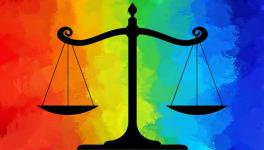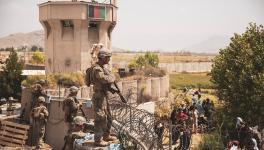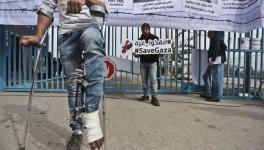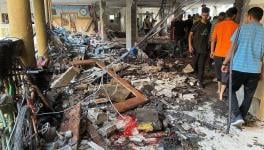Amnesty International Report Denounces Repression of Activists in Mauritania
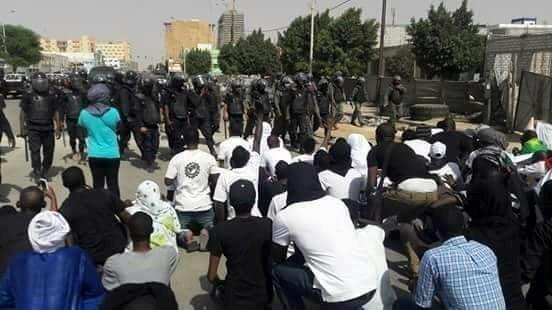
Youth protest in 2017 repressed by security forces.
Human rights defenders in Mauritania, who denounce the persistent practice of slavery and discrimination, risk facing arbitrary detention, torture, imprisonment in remote facilities and systematic prohibition of their meetings, says Amnesty International in a report that was published on March 22.
The report titled ‘A sword that hangs over our heads: The repression of activists protesting against discrimination and slavery in Mauritania’ documents the increasing crackdown on activists, as well as the denial of the problem by the government.
“The fact that despite having abolished slavery in legislation about 40 years ago, the Mauritanian authorities continue not only to tolerate the practice, but also repress those who stand against it, is a shameful disregard of human rights,” said Alioune Tine, Amnesty International’s director for West and Central Africa. In 2016, international groups against slavery calculated nearly 43,000 people in Mauritania – approximately 1% of its population – lived in a state of slavery.
“With some important elections this year and the next, the risk of social unrest will be high unless all voices, including critical ones, are respected. The authorities must stop this attack on people who defend human rights and take concrete and meaningful measures to end slavery and discrimination.”
Amnesty International has concluded that the police, the prosecutors and the judiciary did not properly respond to cases of exploitation, and failed to identify the victims or punish the alleged perpetrators. In 2016, anti-slavery tribunals in the country convicted only two people despite looking into 47 cases involving 53 suspects.
The report reveals that discriminatory practices especially affect the members of the Haratin and afro-Mauritanian communities. These practices include limited representation in positions of leadership, as well as obstacles to their documentation in official records. The latter, among other things, limits their access to essential services.
Crackdown on protests
In Mauritania, the right to protest is often suppressed, 20 human rights group informed Amnesty International that in the last few years, authorities have prohibited or broken up peaceful gatherings, sometimes using excessive force, leading to participants sustaining serious injuries, including fractures and traumatic brain injuries.
For instance, in April 2017, a march of almost 100 youth activists, who were demanding inclusive educational policies, was violently broken up in the capital Nuakchot, and 26 people were detained.
On November 28, 2017, security forces beat up members of the Association of Widows and Orphans after 15 of them were detained during a peaceful protest. One of the orphans had to be hospitalised after sustaining a blow to the head.
Action for two incarcerated anti-slavery activists
Amnesty International has launched a cyber-action in its online activism center seeking the liberation of Moussa Bilal Biram and Abdallahi Matallah Saleck, activists of the anti-slavery movement IRA (Initiative for the Revival of the Abolitionist Movement in Mauritania).
They are in a prison in Bir Moghrein in the Sahara Desert. This prison that is customarily used for those on the death row is located in a remote region of Mauritania, 1,200 km from the capital city, where the activists hail from. The duo was accused of inciting riots and violent rebellion against the government although in their trials, no evidence was presented to support these charges.
According to the reports, Moussa and Abdallahi have been tortured while in custody, and their injuries show that they were forced to remain in painful positions for hours.
“Welcome to Guantanamo”
Since 2014, Amnesty International has documented 168 cases of human rights defenders being detained arbitrarily. Of these, at least 17 were subjected to torture and other abuses.
The authorities have detained 23 members of the pro-democracy youth group, February 25th Movement, since 2014. During this period, they also detained 63 members of the IRA.
At least 15 members of the IRA have been sentenced to jail terms in unjust trials and some were subjected to torture and other abuses to obtain “confessions”, the report says.
Amadou Tijane Diop, an anti-slavery activist detained in 2016, told Amnesty International in June 2017, “The police put me in handcuffs and blindfolded me. I did not have any idea where they were taking me. When we arrived, a policeman said: ‘Welcome to Guantanamo’. […] Before bringing me to interrogation, a guard told me: ‘Tell them what they want to hear. You know we have what it takes to make you talk.”
Smear campaigns
The report says those who defend human rights have been labelled as traitors, delinquents, foreign agents, racists, heretics or politicians. This intimidation comes from the highest levels of the State and from faith groups.
For example, human rights defender Mekfoula Brahim has been subjected to a coordinated and sustained smear campaign on social media and has received death threats for demanding that the death sentence on blogger Mohamed Mkhaïtir be annulled.
Authorization, a weapon
The report documents the cases of more than 43 groups that have not received authorization from the authorities to operate despite multiple requests. Among them are the pro-democracy youth organization Kavana (Enough!) and the IRA.
“Not being recognized as an ‘authorized association’ is like having a sword hanging over our heads. We continue carrying out our activities, but we know that an any moment, the authorities could shut us down and put us in jail,” Yacoub Ahmed Lemrabet, president of Kavana, told Amnesty International:
“The campaigns that depict people who defend human rights as threats to national security or cultural values puts activists in danger and has a destructive effect on freedom of speech,” concluded Alioune Tine.
“The Mauritanian authorities should show that they respect all critical voices by freeing all the people who were detained only for denouncing discrimination and by recognizing the work of human rights defenders”, the report says.
Get the latest reports & analysis with people's perspective on Protests, movements & deep analytical videos, discussions of the current affairs in your Telegram app. Subscribe to NewsClick's Telegram channel & get Real-Time updates on stories, as they get published on our website.














